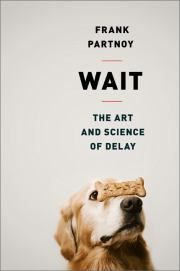Procrastination
7 Tips: When Every Millisecond Matters
Give your brain 7 insights for making better decisions.
Posted December 15, 2012

Reptiles freeze when threatened, while mammals tend to run. As humans, there are times both impulses war within our brains. Choices are often made in tiny fractions of a second.
In Wait: The Art and Science of Delay, Frank Partnoy cites hundreds of studies in a wide range of fields to make his points. Much of this is brain science, so it becomes a matter of absorbing these insights, whether you can use them directly in your own life or not. Some of the studies are of heart rate variability, which, surprisingly, can teach us something about future behavior and mental health.
According to one of the experts quoted by Partnoy, the vagal nerve running from our brain stem may be two strands wrapped together, both connected to the heart. One would be the more crude reptilian part and the other, the more modern mammalian part. One part says slow down, withdraw, freeze. The other reacts to stimulation with alert flexibility, mobilizing for action.
Partnoy is the George E. Barrett Professor of Law and Finance and is the director of the Center for Corporate and Securities Law at the University of San Diego, has written three books about Wall Street, greed, and financial scandals. In Wait, he tackles a variety of different realms, including the financial markets, sports, first dates, fighter pilots, physicians' racial biases, and how being aware of time pressure affects performance. There's a chapter on procrastination, too.
Here are 7 insights you'll find explained in Wait:
1. With at least half a second to make a decision, we can think, consciously, whether we decide to go along with our automatic reactions or to slow or change them.
2. Know when you're an expert in something. If you know your field extremely well, you can go with your gut, so to speak. If you're not an expert, you should delay as long as possible before deciding or acting. You can be an expert in a field, yet be confronted by a new twist that throws you back to novice level. Being able to recognize when that's happening is rare.
3. Time pressure helps experts in many areas, much like blitz chess players, perform well under time pressure. They shut down their conscious system and trust themselves.
4. Do a premortem, suggests one expert quoted by Partnoy. Prepare in advance for when you're going to be in a time-pressured situation. Assume the worst results of a potential crisis and figure out why they would have happened.
5. "Thin slicing" is not necessarily good. We may be able to make a judgment about someone in a few seconds, but a little bit of extra time can make a big difference in making a good decision.
6. Kids can learn stereotyping by watching those around them, like their parents, making too-speedy unconscious decisions about other people. And perhaps they can learn egalitarianism by noticing their parents interacting in a purposefully non-prejudicial way.
7. It may be humankind's basic impulse to defer effort, discomfort, or boredom, and thus there may be only so much one can do to make oneself do what one thinks one wants to do. When we choose to do something, we're always putting off something else we could be doing. It's always a trade-off, and becoming more conscious about our choices can help.
- Partnoy's blog.
Copyright (c) 2012 by Susan K. Perry


